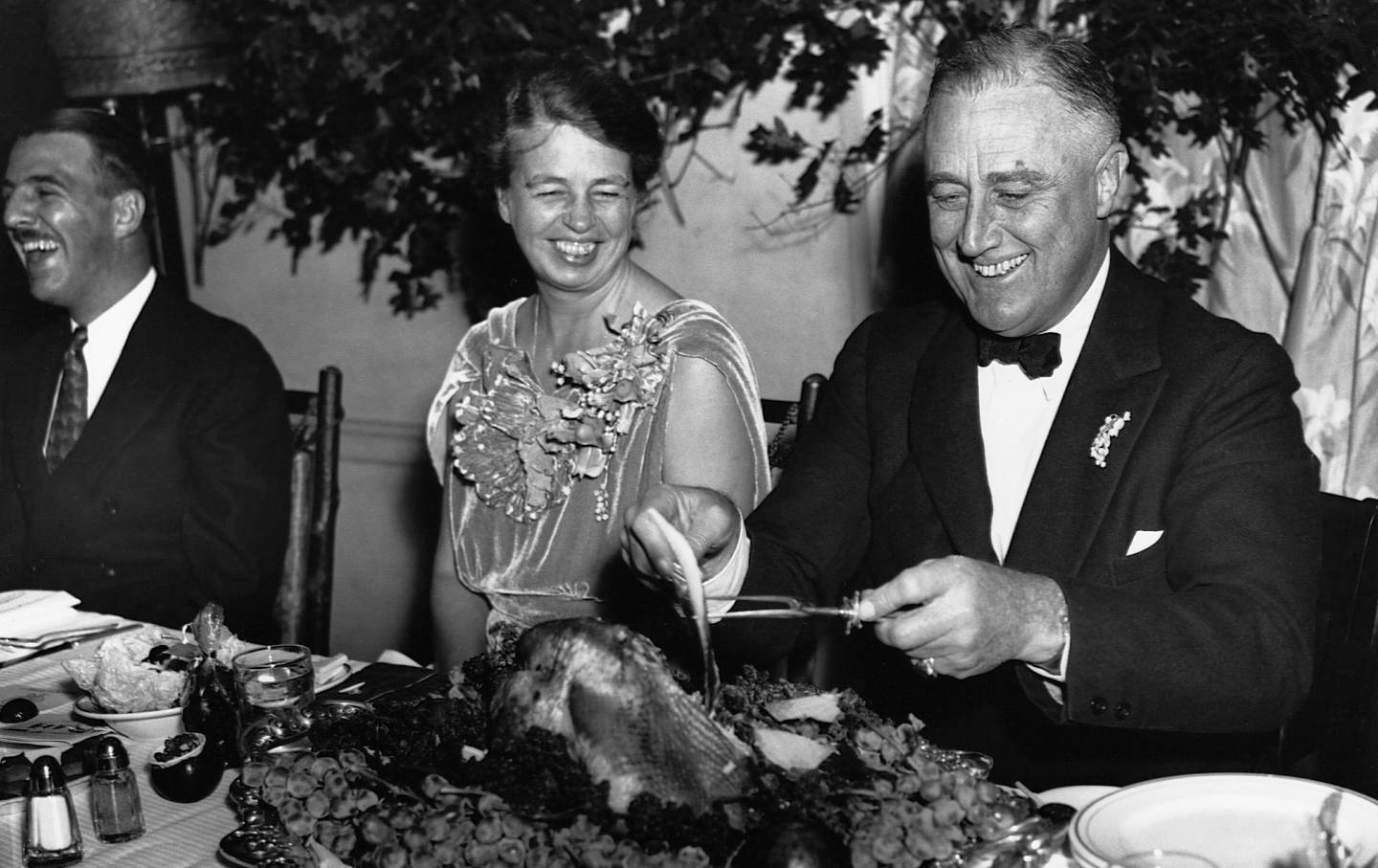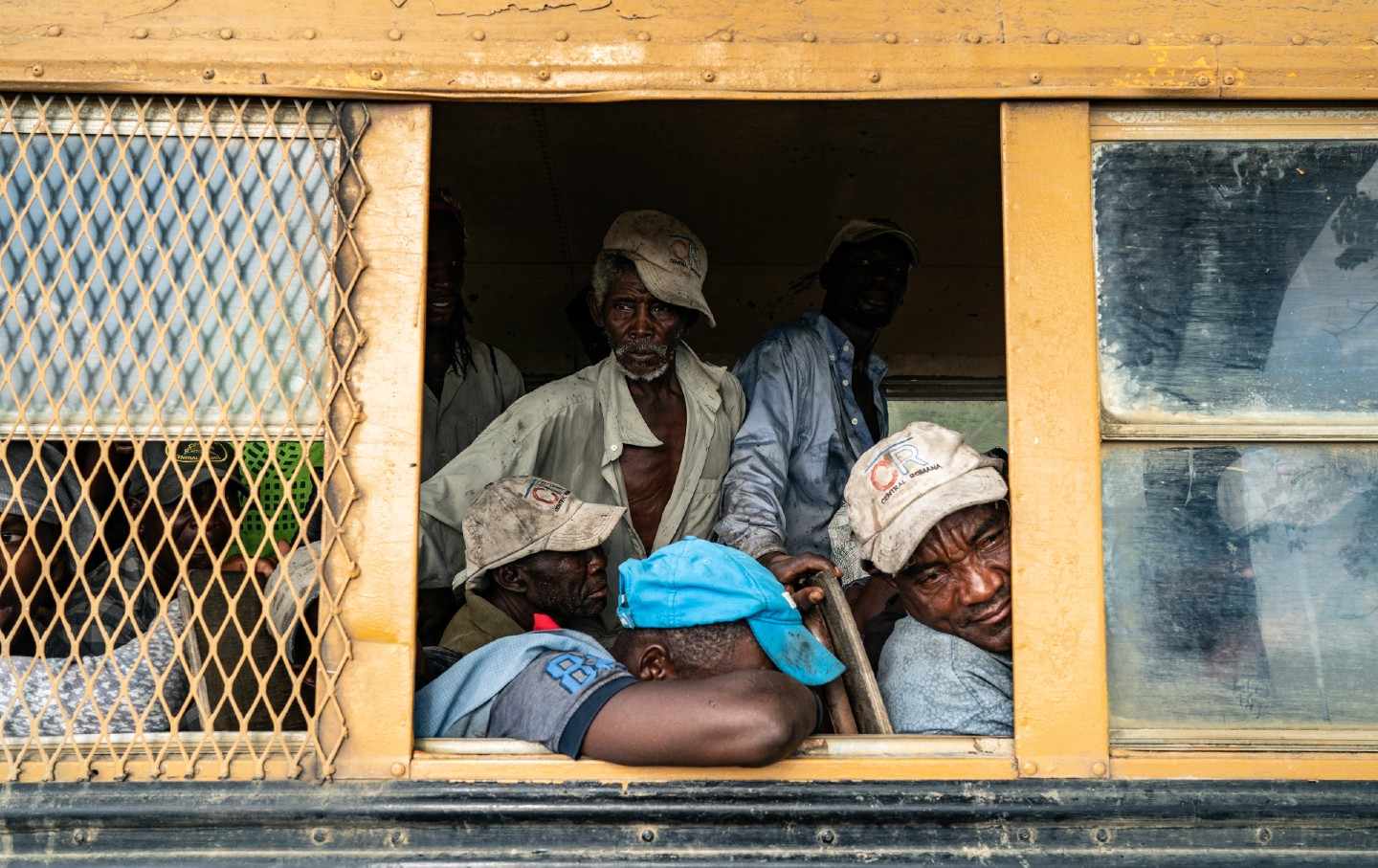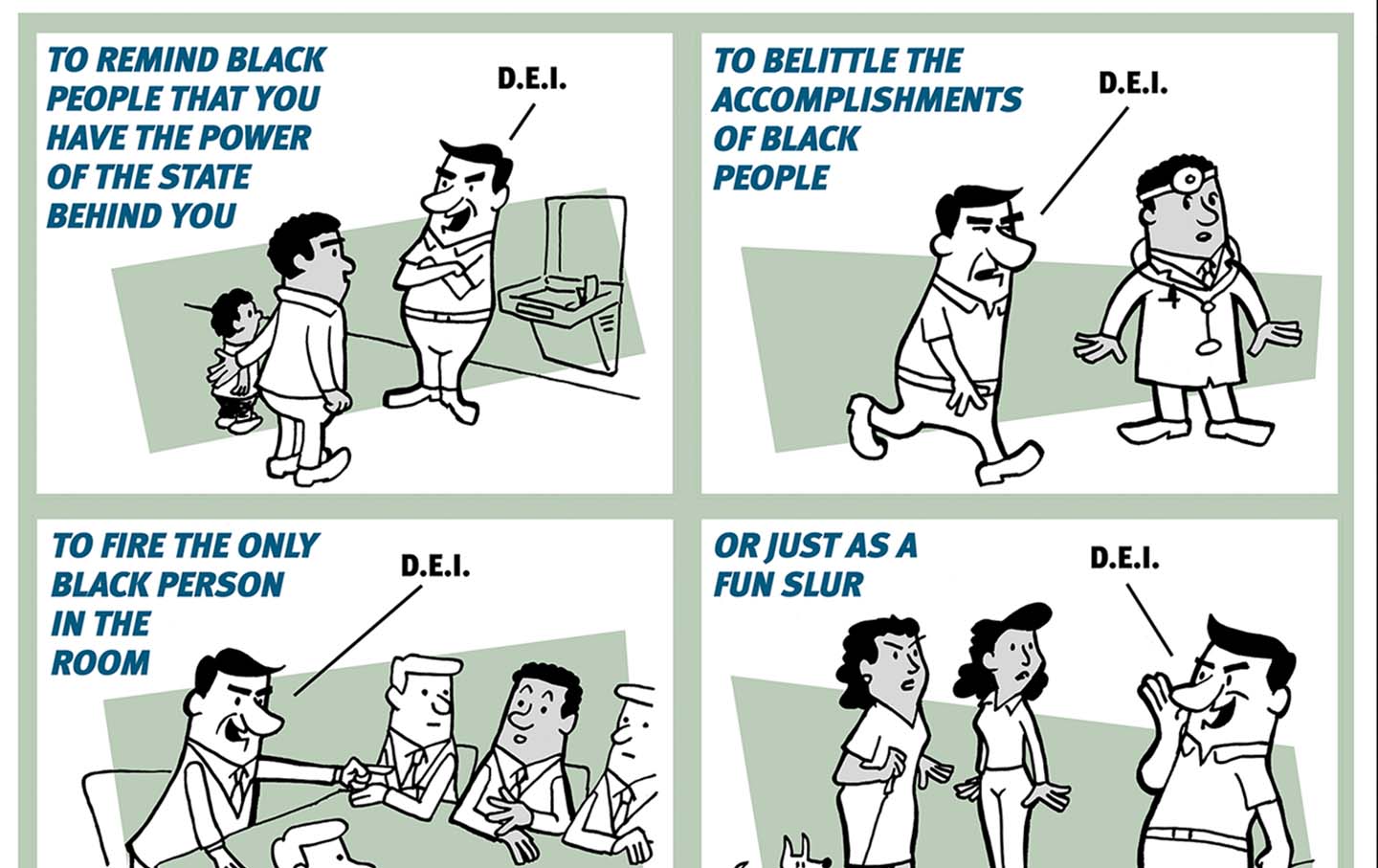FDR Taught Us How to Talk Politics on Thanksgiving
The 32nd president used his holiday proclamations to call for “the establishment on earth of freedom, brotherhood, and justice.”

Thanksgiving 1933.
(Bettmann / Corbis / Bettmann Archive)Robert Reich offers advice for holiday gatherings with family members and friends who may not be aligned ideologically: Talk politics.
Just do it in a smart way.
The former secretary of labor doesn’t advocate launching into partisan arguments around the Thanksgiving dinner table. Rather, he suggests that, on days when we are supposed to be inclined toward fellowship and generosity, we should not hesitate to discuss how that might be achieved. “Name-calling will get you nowhere,” suggests Reich. Rather, he says, handle disagreeable tablemates with a good-spirited observation: “You know, we have much more in common than it seems. You care about America. I care about America. We all want a stronger economy. We all care about money in politics. We all want to leave a better world for our kids.”
That’s wise counsel as we enter into a holiday season when tensions are especially high in America. There is no point in denying the fact that ours is a deeply divided nation, buffeted by economic inequality and systemic injustice. This is a country where antisemitism and Islamophobia are on the rise, where racism and xenophobia and anti-trans hate are on open display not just on our streets but also in our legislative chambers; where former president Donald Trump is pulling words out of the fascist lexicon to refer to his critics as “vermin” and to claim that immigration is “poisoning the blood of our country,” and where social media platforms are flooded with crude stereotyping and vile hate-mongering.
The atomization of communications means that Americans no longer begin conversations—on holidays or most other days—with a common set of facts, or an inclination to hear one another out. It is easy to scoff that Reich is naive to imagine that we can still engage in a civil discourse that strives for not just common ground but justice.
Yet, we’ve been divided before. And, at our best, we have found our ways back to one another.
Franklin Delano Roosevelt recognized that longing for higher-ground connections and conversations. And he spoke to it in times when Americans were at odds with one another about economic fundamentals, when Jim Crow segregation and anti-immigrant sentiment were widespread, when fascism was on the rise at home and abroad, and when people worried that exploding tensions abroad would lead to globe-spanning warfare.
The 32nd president did not avoid these tensions. He addressed them, with every tool that was available—including the dozen Thanksgiving Proclamations he issued during his presidency.
Unlike most presidents, before his tenure and since, Roosevelt recognized that drafting a Thanksgiving proclamation should be more than just another perfunctory task on a mid-November “to do” list. The 32nd president’s proclamations were distinct statements that promoted liberal idealism and cooperation in struggles against economic turbulence at home and the rise of fascism in Europe.
Roosevelt broke new ground with his statements, using them to teach about religious diversity and to decry racial and ethnic divisions. As an example, Roosevelt’s proclamation for Thanksgiving Day 1941 appealed for “the establishment on earth of freedom, brotherhood, and justice.”
FDR’s most persistent theme in his Thanksgiving proclamations was the need to develop a new economic order.
His first Thanksgiving proclamation, written in the depths of the Great Depression, declared:
Popular
“swipe left below to view more authors”Swipe →“May we ask guidance in more surely learning the ancient truth that greed and selfishness and striving for undue riches can never bring lasting happiness or good to the individual or to his neighbors. May we be grateful for the passing of dark days; for the new spirit of dependence one on another; for the closer unity of all parts of our wide land; for the greater friendship between employers and those who toil; for a clearer knowledge by all nations that we seek no conquests and ask only honorable engagements by all peoples to respect the lands and rights of their neighbors; for the brighter day to which we can win through by seeking the help of God in a more unselfish striving for the common bettering of mankind.”
Here was a president seeking not to deny economic turbulence but to offer a vision for the country to respond to that turbulence as a united citizenry rather than as isolated individuals.
This message was a constant for Roosevelt as he implemented the New Deal.
During the past year we have been given courage and fortitude to meet the problems which have confronted us in our national life. Our sense of social justice has deepened. We have been given vision to make new provisions for human welfare and happiness, and in a spirit of mutual helpfulness we have cooperated to translate vision into reality,
he wrote in his 1934 proclamation.
More greatly have we turned our hearts and minds to things spiritual. We can truly say, “What profiteth it a nation if it gain the whole world and lose its own soul.” With gratitude in our hearts for what has already been achieved, may we, with the help of God, dedicate ourselves anew to work for the betterment of mankind.
A year later, concerned by the rise of European fascism, Roosevelt was at his most poetic, writing:
“In traversing a period of national stress our country has been knit together in a closer fellowship of mutual interest and common purpose. We can well be grateful that more and more of our people understand and seek the greater good of the greater number. We can be grateful that selfish purpose of personal gain, at our neighbor’s loss, less strongly asserts itself. We can be grateful that peace at home is strengthened by our growing willingness to common counsel. We can be grateful that our peace with other nations continues through recognition of our peaceful purpose. But in our appreciation of the blessings that Divine Providence has bestowed upon us in America, we shall not rejoice as the Pharisee rejoiced. War and strife still live in the world. Rather must America by example and in practice help to bind the wounds of others, strive against disorder and aggression, encourage the lessening of distrust among peoples and advance peaceful trade and friendship.”
The past, as they say, is prelude. And, if ever there was a time for binding wounds, striving against disorder and aggression, and lessening distrust among peoples, this is it. So, by all means, take Robert Reich’s advice—and let’s have another helping of FDR’s wisdom.
Hold the powerful to account by supporting The Nation
The chaos and cruelty of the Trump administration reaches new lows each week.
Trump’s catastrophic “Liberation Day” has wreaked havoc on the world economy and set up yet another constitutional crisis at home. Plainclothes officers continue to abduct university students off the streets. So-called “enemy aliens” are flown abroad to a mega prison against the orders of the courts. And Signalgate promises to be the first of many incompetence scandals that expose the brutal violence at the core of the American empire.
At a time when elite universities, powerful law firms, and influential media outlets are capitulating to Trump’s intimidation, The Nation is more determined than ever before to hold the powerful to account.
In just the last month, we’ve published reporting on how Trump outsources his mass deportation agenda to other countries, exposed the administration’s appeal to obscure laws to carry out its repressive agenda, and amplified the voices of brave student activists targeted by universities.
We also continue to tell the stories of those who fight back against Trump and Musk, whether on the streets in growing protest movements, in town halls across the country, or in critical state elections—like Wisconsin’s recent state Supreme Court race—that provide a model for resisting Trumpism and prove that Musk can’t buy our democracy.
This is the journalism that matters in 2025. But we can’t do this without you. As a reader-supported publication, we rely on the support of generous donors. Please, help make our essential independent journalism possible with a donation today.
In solidarity,
The Editors
The Nation








